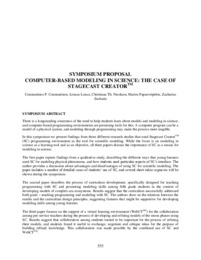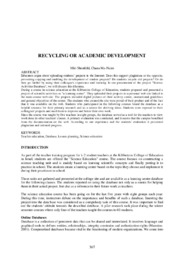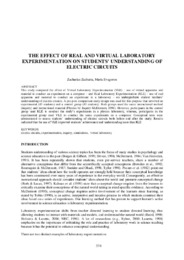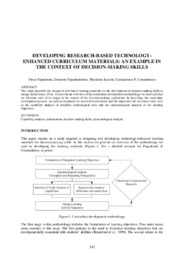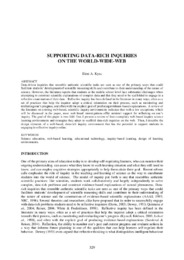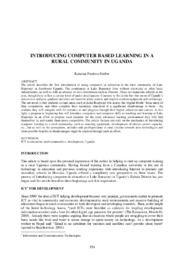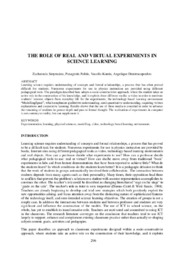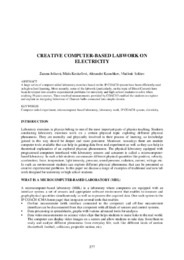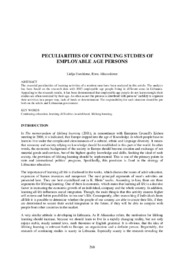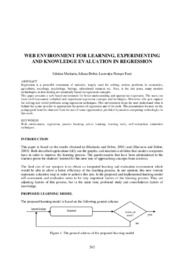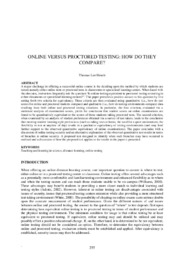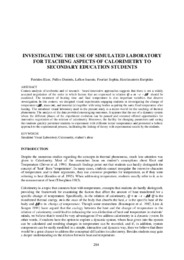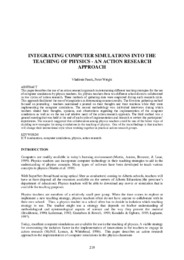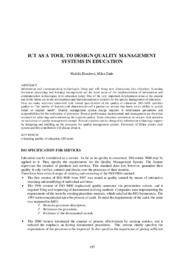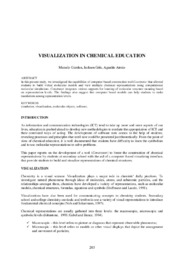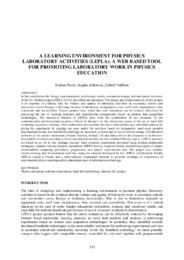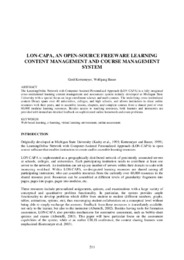CBLIS Conference Proceedings 2005 Integrating New Technologies in Science and Education: Recent submissions
Now showing items 21-40 of 62
-
Symposium proposal computer-based modeling in science: the case of stagecast creator
(University of Zilina, 2005)There is a longstanding awareness of the need to help students learn about models and modeling in science, and computer-based programming environments are promising tools for this. A computer program can be a model of a ... -
Recycling or academic development
(University of Zilina, 2005)Educators argue about uploading students’ projects to the Internet. Does this support plagiarism or the opposite, preventing copying and enabling the development of student projects? Do students recycle old projects? Or ... -
Problem based learning over the internet
(University of Zilina, 2005)The main goal of this paper is to discuss a new form of learning that would be appropriate for application in Learning Management Systems utilized in distance education courses over the Internet. It is supposed to be good ... -
The effect of real and virtual laboratory experimentation on students’ understanding of electric circuits
(University of Zilina, 2005)This study compared the effect of Virtual Laboratory Experimentation (VLE) - use of virtual apparatus and material to conduct an experiment on a computer - and Real Laboratory Experimentation (RLE) - use of real apparatus ... -
Computerized science problem solving and cognitive support: effects on achievement outcomes
(University of Zilina, 2005)Four support components were identified (structural, reflective, subject-matter and enrichment) and used to construct four unique cognitive support programs (integrated, strategic, operative and enrichment), based on human ... -
Volume: a computer microworld For the learning of the concept of volume
(University of Zilina, 2005)This paper presents the design and basic features of a computer microworld for learning the concept of volume, for use by both primary and secondary level education students. The design of this microworld is the result of ... -
Developing research-based technology-enhanced curriculum materials: an example in the context of decision-making skills
(University of Zilina, 2005)This study describes the design of web-based learning materials for the development of decision-making skills in energy-based issues. First, we provide an overview of the curriculum development methodology we used and then ... -
Supporting data-rich inquiries on the world-wide-web
(University of Zilina, 2005)Data-driven inquiries that resemble authentic scientific tasks are seen as one of the primary ways that could facilitate students’ development of scientific reasoning skills and contribute to their understanding of the ... -
Introducing computer based learning in a rural community in uganda
(University of Zilina, 2005)The article describes the first introduction of using computers in education in the rural community of Lake Bunyonyi in Southwest Uganda. The community at Lake Bunyonyi lives without electricity or other basic infrastructure, ... -
The role of real and virtual experiments in science learning
(University of Zilina, 2005)Learning science requires understanding of concepts and formal relationships, a process that has often proved difficult for students. Numerous experiments for use in physics instruction are provided using different pedagogical ... -
Creative computer-based labwork on electricity
(University of Zilina, 2005)A large series of computer-aided laboratory exercises based on the IP COACH system have been efficiently used in high-school learning. More recently, some of the labwork (particularly, on the topic of Direct Current) have ... -
Peculiarities of continuing studies of employable age persons
(University of Zilina, 2005)The essential peculiarities of learning activities of a modern man have been analyzed in this article. The analysis has been based on the research data with 1013 employable age people living in different areas in Lithuania. ... -
Web environment for learning, experimenting and knowledge evaluation in regression
(University of Zilina, 2005)Regression is a powerful instrument of statistics, largely used for solving various problems in economics, agriculture, sociology, psychology, biology, educational sciences etc. Also, in the last years, many modern ... -
Online versus proctored testing: how do they compare?
(University of Zilina, 2005)A major challenge in offering a successful online course is the deciding upon the method by which students are tested; namely either online tests or proctored tests in classrooms or specialized learning centers. When faced ... -
Investigating the use of simulated laboratory for teaching aspects of calorimetry to secondary education students
(University of Zilina, 2005)Content analysis of textbooks and of research - based innovative approaches suggests that there is not a widely accepted negotiation of the order in which factors that are expressed in relation Q = m c should be ... -
Integrating computer simulations into the teaching of physics - an action research approach
(University of Zilina, 2005)This paper describes the use of an action research approach in determining different teaching strategies for the use of computer simulations by physics teachers. Six physics teachers from two different school districts ... -
ICT as a tool to design quality management systems in education
(University of Zilina, 2005)Information and communication technologies bring and will bring new dimensions into education. Learning document processing and learning management are the main areas of the implementation of information and communication ... -
Visualization in chemical education
(University of Zilina, 2005)In this present study, we investigated the capabilities of computer-based construction tool Construtor that allowed students to build virtual molecular models and view multiple chemical representations using computational ... -
A learning environment for physics laboratory activities (lepla): a web based tool for promoting laboratory work in physics education
(University of Zilina, 2005)In this contribution the design, implementation, preliminary results, evaluation strategy and anticipated outcomes of the EU funded project LEPLA will be described and discussed. The design and implementation of this project ... -
Lon-capa, an open-source freeware learning content management and course management system
(University of Zilina, 2005)The LearningOnline Network with Computer-Assisted Personalized Approach (LON-CAPA) is a fully integrated cross-institutional learning content management and assessment system initially developed at Michigan State University ...
